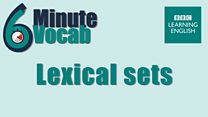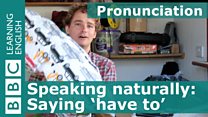Unit 24: English You Need
Exams, news, pronunciation, teachers' tips, learners' questions
Select a unit
- 1 English You Need
- 2 English You Need
- 3 English You Need
- 4 English You Need
- 5 English You Need
- 6 English You Need
- 7 English You Need
- 8 English You Need
- 9 English You Need
- 10 English You Need
- 11 English You Need
- 12 English You Need
- 13 English You Need
- 14 English You Need
- 15 English You Need
- 16 English You Need
- 17 English You Need
- 18 English You Need
- 19 English You Need
- 20 English You Need
- 21 English You Need
- 22 English You Need
- 23 English You Need
- 24 English You Need
- 25 English You Need
- 26 English You Need
- 27 English You Need
- 28 English You Need
- 29 English You Need
- 30 English You Need
Session 5
Learners' Questions
Welcome to Learners' Questions - the series where we answer your queries about the English language. What will this week's learner question be?
Activity 1
Learners' Questions
Wear, put on, dress
Tugba from Turkey says: I would like to know the difference between wear, put on and dress
Watch the video and complete the activity

Dan
Hi guys! Dan from BBC Learning English here with this week's Learner Question. Find out what it is after this.
OK! This week's Learner Question comes from Tugba from Turkey, who writes: "Hello, I would like to know the difference between wear, put on and dress." It’s a good question, Tugba, and three very confusing words. I hope you like the answer. Here it comes.
So, when you wear clothes, shoes or jewellery, you have them on your body. You can also wear your hair in a particular style. For example, I’m wearing a green shirt and a silver wedding ring. I usually wear my hair short.
There is another meaning to wear, which is: become used and weaker over time, like the phrasal verb wear out. For example, I need to buy some new shoes. My old ones are getting worn out. This can also be applied to humans when they become tired. After a long day at work, I might say, I’m worn out. I need to go home.
When you put clothes on, you place them on your body in order to wear them. Also, when you’ve finished wearing them, you take them off. First you put on, then you wear them, then you take them off. For example, this morning I put on this green shirt, and later I’ll take it off.
You can also put on weight. This means to gain or accumulate kilograms. The opposite is to lose weight. For example, I thought I was going to put on weight on holiday last week, but I actually lost weight because I went swimming every day.
When you dress, you put clothes on. If you dress up, then you wear smarter clothes than usual. Likewise, if you dress down then you wear less smart clothes than usual. We also talk about getting dressed as an alternative to the verb dress. And there’s little difference between them. For example, I need to dress. The taxi’s coming in twenty minutes. Or, I need to get dressed. The taxi’s coming in twenty minutes. No big deal.
Other things you can dress are other people, such as children, you can dress a wound by cleaning it and covering it with a bandage and you can dress a salad by adding oil and vinegar to it.
I hope that answers your question Tugba. Thank you very much for writing to us. If anybody else out there has a question for Learners’ Questions, you can email us on: learning.english@bbc.co.uk. Please remember to put Learners’ Questions in the subject box and your name and where you’re writing from. We get a phenomenal amount of email, guys and we can’t answer every single one, but we do read all of them. And for more information, go to our website: bbclearningenglish.com. That’s it for this week’s Learners’ Questions. I’ll see you next time. Bye!
___________________________________________________________________
Did you like that? Why not try these?
___________________________________________________________________
Summary
Wear
If you wear clothes, shoes or jewellery, you have them on your body. You can also wear you hair in a particular style.
I’m wearing a green shirt and a silver wedding ring. I usually wear my hair short.
Wear out
To wear out is to become worn and used over time. People can also use this phrasal verb to describe when they are feeling tired.
I need to buy some new shoes. My old ones are getting worn out.
I’m worn out. I need to go home.
Put on
If you put clothes on, you place them on your body to wear them. Once you have finished wearing the clothes, you take them off. A person can also put on weight, meaning to gain kilograms - to become heavier.
this morning I put on this green shirt, and later I’ll take it off.
I thought I was going to put on weight on holiday last week, but I actually lost weight because I went swimming every day.
Dress
If you dress, you put clothes on. If you dress up, you wear smarter clothes than usual. Likewise, if you dress down, you wear less smart clothes than usual. An alternative way to say dress is get dressed. There is little difference between the two. You can also dress other people, such as children, wounds and salads.
I need to dress. The taxi’s coming in twenty minutes. Or, I need to get dressed. The taxi’s coming in twenty minutes
To do
Try our quiz to see what you've learned about this topic.
Learners’ Questions Quiz
4 Questions
Decide if these sentences are correct or incorrect
Help
Activity
Decide if these sentences are correct or incorrect
Hint
Which verb do we use to talk about the way we have our hair?Question 1 of 4
Help
Activity
Decide if these sentences are correct or incorrect
Hint
Can a person wear out?Question 2 of 4
Help
Activity
Decide if these sentences are correct or incorrect
Hint
If we wear smarter clothes than usual, do we dress down?Question 3 of 4
Help
Activity
Decide if these sentences are correct or incorrect
Hint
Do we wear a salad? If not, which verb can we use?Question 4 of 4
Excellent! Great job! Bad luck! You scored:
End of Session 5
Well, that's it for this unit! Join us again in Unit 25 for more Exam Skills, News Review, Pronunciation in the News, The Teachers' Room and Learners' Questions!
Session Vocabulary
Wear
Have clothes on your body
Put on
Put clothes on your body to wear them
Dress
Put clothes on your body to wear them


